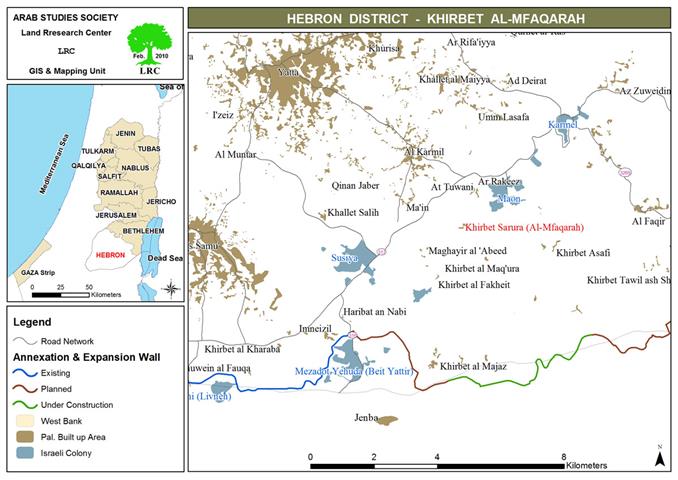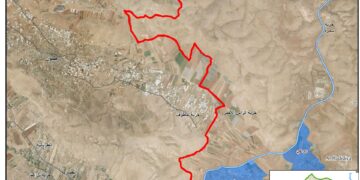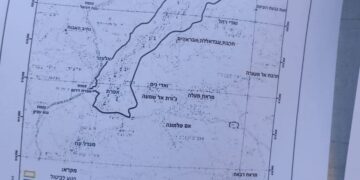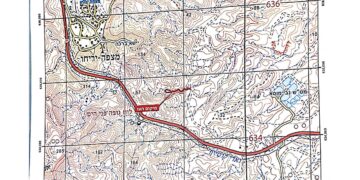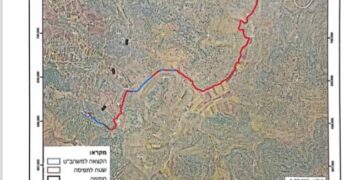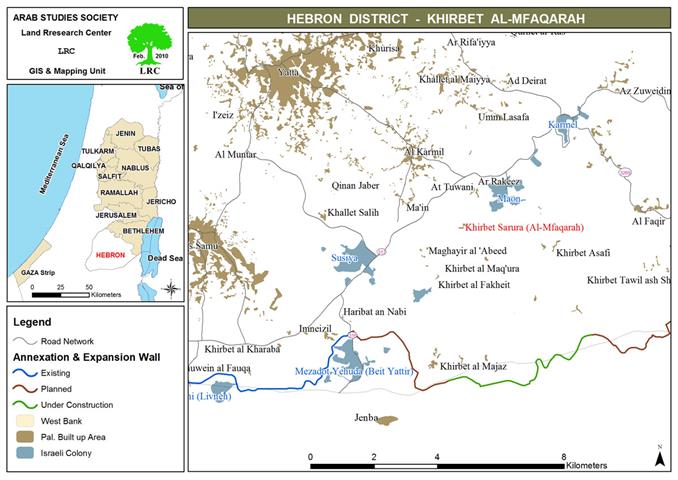The Israeli occupation authorities handed over a notice requiring to stop work and construction in the house of Mr. Na’man Hamamdeh from Khirbet Al Mufaqra south of the town of Yata, Hebron governorate, for allegedly building without permission. See Map 1
The notice was handed over to Mr. Hamamdeh’s neighbors on February 1, 2010 in the area of Khalet Rahila south of Yata. The house total surface area is 100 square meters and work began on it at the end of the last year. See Order 1
The dream of the family is destroyed:
The threatened house is supposed to shelter a family of ten people who now live in tents in Khirbet Al Mufaqra, but the Israeli occupation has destroyed the dream of this family to live in their new house.
It is worth mentioning that last year the occupation authorities delivered orders to stop work and construction in many homes, tents and mosque in the same Khirebt under the pretext of building without license.
Khirbet Al Mufaqra at a glance:
It is an impoverished primitive residential compound in the far east end of the town of Yata (about 17 km from Yata) which has been inhabited generation after generation. Now it has a population of about 150 people, spread over 22 families all descend form the clan of Hamamdeh and administered by a village council who works jointly with another impoverished hamlet -Khirbet at Tuwani- and headed by Mr. Saber Hareeni.
Photo 1: a general view of Khirbet Al Mufaqra
Al Mufaqra hamlet is bordered from north by the colonial outpost of Khafat Maon, from west by the colony of Avi Gal, and bypass road number 60, from south by the colonial outpost of Yacoub Dalia and from east by the Maon colony.
House demolition in light of human rights, international covenants and treaties
Israel as an occupier should abide by the international human rights treaties to which it is a state party, including: The International Covenant on Economic, Social and Cultural Rights (ICESCR) and the International Convention on the Elimination of All Forms of Racial Discrimination. As an occupier Israel should also abide by the international humanitarian law including: The Hague Regulations and the Forth Geneva Convention. The halt of construction notification in Khirbet Al Mufaqra of Yata area, Hebron district is a violation of these rights and covenants. Israel should be held accountable for its acts in the occupied Palestinian Territory; should comply with the international legitimacy, laws treaties and United Nations’ resolutions; and Israel’s long time apathy of the international community’s wills must come to an end.
Following is a synopsis of Articles within these covenants, conventions and laws that address the issue of house demolitions and forced evictions under these articles:
International Covenant on Economic, Social and Cultural Rights
-
Article 11 (1): ‘The States Parties to the present Covenant recognize the right of everyone to an adequate standard of living for himself and his family, including adequate food, clothing and housing, and to the continuous improvement of living conditions.
International Convention on the Elimination of All Forms of Racial Discrimination (1965)
-
Article 5: ‘States’ Parties undertake to prohibit and eliminate racial discrimination in all of its forms and to guarantee the right of everyone, without distinction as to race, color, or national or ethnic origin, to equality before the law, notably in the enjoyment of the following rights: … (e) in particular … (iii) the right to housing.
Universal declaration of human rights, Article 17:
1. ‘Everyone has the right to own property alone as well as in association with others.
2. ‘No one shall be arbitrarily deprived of his property.
Article 25:
-
‘Everyone has the right to a standard of living adequate for the health and well-being of himself and of his family, including food, clothing, housing and medical care and necessary social services, and the right to security in the event of unemployment, sickness, disability, widowhood, old age or other lack of livelihood in circumstances beyond his control.
The Fourth Geneva Convention
-
Article 53: ‘Any destruction by the Occupying Power of real or personal property belonging individually or collectively to private persons, or to the State, or to other public authorities, or to social or cooperative organizations, is prohibited, except where such destruction is rendered absolutely necessary by military operations.
-
Article 47: ‘Protected persons who are in occupied territory shall not be deprived, in any case or in any manner whatsoever, of the benefits of the present Convention by any change introduced as the result of the occupation of a territory, into the institutions or government of the said territory, nor by any agreement concluded between the authorities of the occupied territory and the Occupying power, nor by any annexation by the latter of the whole or part of the occupied territory.
-
Article 147: ‘Grave breaches to which the preceding Article relates shall be those involving any of the following acts … extensive destruction and appropriation of property, not justified by military necessity and carried out unlawfully and wantonly.
Hague Regulations 1907
-
Section II Article 23: ‘it is especially forbidden- to destroy or seize the enemy’s property, unless such destruction or seizure be imperatively demanded by the necessities of war.
-
Section III Article 46: ‘Family honor and rights, the lives of persons, and private property, as well as religious convictions and practice must be respected. Private property cannot be confiscated.
Prepared by
The Land Research Center
LRC



